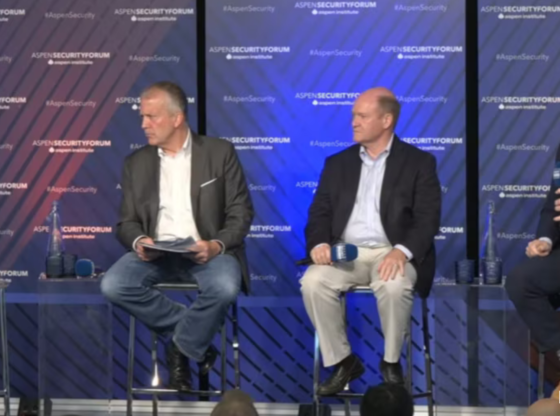WASHINGTON — As the remarks of former US Republican presidential candidate Donald Trump that Taiwan must pay for its defense continue to ferment, some congressional Republicans defended Trump’s remarks, saying that his actions on the Taiwan issue are more important than words, and emphasized the importance of the United States maintaining deterrence on the Taiwan issue. US National Security Advisor Jake Sullivan also said at the Aspen Security Forum that the basic goal of US policy must be to ensure that a war in the Taiwan Strait will never happen.
In an exclusive interview published by Bloomberg Businessweek on Tuesday (July 16), U.S. Republican presidential candidate Trump said in response to the question of whether he would defend Taiwan that he believed Taiwan had stolen all of the U.S. chip business and that Taiwan should pay the United States for its defense.
This statement has triggered heated discussions among all sectors about whether Washington’s position on the Taiwan Strait issue will change if Trump becomes the next US president.
Trump won’t defend Taiwan? Republican senator: Actions speak louder than words
In response, Republican Senator Sullivan of Alaska, a member of the Senate Armed Services Committee, said Friday during a discussion at the Aspen Security Forum that actions and record on the issue are more important than words.
“I would say that on a lot of these issues, the record probably matters more than the rhetoric,” he said. “The record on Taiwan during the Trump administration was probably the strongest of any administration. We shipped them more weapons during that time than the past several administrations combined, and sent high-level delegations and even Cabinet officials.”
Sullivan emphasized that he believes what the United States needs to do in the Taiwan Strait is to continue to assist Taiwan in developing its military capabilities and to train “an army capable of responding.”
The statement by former US Republican presidential candidate and former President Trump that Taiwan should pay for its defense continues to ferment. However, Republican Senator Dan Sullivan
Sullivan served in the Marine Corps. When the Taiwan Strait crisis occurred in 1996, tensions between the two sides of the Taiwan Strait were on the verge of breaking out, and then-US President Bill Clinton urgently mobilized and dispatched two aircraft carrier battle groups to the Taiwan Strait. Sullivan was on one of the warships at the time and participated in that historical event.
Sullivan has repeatedly expressed his support for Taiwan in Congress and proposed bills to support Taiwan. In March last year, he introduced the “STAND with Taiwan Act.” This is the second time Sullivan has proposed this bill. He also proposed the same bill in the previous Congress.
The bill would impose “severe and comprehensive economic and financial sanctions” if the “People’s Liberation Army or its agents” launched a military invasion of Taiwan, including sanctions on members of the Chinese Communist Party and its industry, and prohibiting U.S. financial institutions – including investment firms, private equity firms, venture capital firms and hedge funds – from investing in any Chinese entity with ties to the Chinese Communist Party.
The bill would also ban the import of certain goods that are mined, produced, or manufactured in whole or in part in the People’s Republic of China.
“It’s about letting Xi Jinping know that if he invades Taiwan, we’re going to impose massive economic, financial and energy sanctions on him,” Sullivan said Friday of the bill at the Aspen Security Forum.
“That’s a three-tier deterrence, and I think that will maintain deterrence in the Taiwan Strait unless Xi Jinping wants to roll the dice. If that happens, you know, I certainly hope we can defend them,” he said.
Senator Cornyn: Xi Jinping should wake up every day and feel that today is not the time to use force against Taiwan
John Cornyn, a Republican senator from Texas and a member of the Senate Intelligence Committee, also said at the same event that he believed the focus of U.S. policy on Taiwan’s security should be to make sure Xi Jinping wakes up every day and feels that today is not the time to take action.
“I don’t know who originally said it, but I agree with the statement that all of our Taiwan policy should be geared toward having President Xi wake up every morning and say ‘Not today,’ and wake up tomorrow and say ‘Not today,’ ” Cornyn said. “We need to keep it that way as long as possible. That should be the focus of our strategy.”
Since Taiwan President Lai Ching-te took office on May 20 this year, Beijing has been stepping up military operations in the Taiwan Strait and launching a legal battle by issuing the “22 Opinions” that include punishing Taiwan independence. Many analysts are worried that the development of cross-strait relations is becoming more severe than before, and China’s series of pressure actions on Taiwan have made the prospects of the Taiwan Strait even bleaker.
Admiral Brown: If a war breaks out in the Taiwan Strait, I am confident that the US military can win the war
Chairman of the Joint Chiefs of Staff Admiral Charles Brown gave an affirmative answer to the question of whether the United States can win a war with China during another discussion at the Aspen Security Forum on Friday.
Jennifer Griffin, chief national security correspondent for Fox News, asked, “From your military perspective, can the United States win a war against China if Beijing tried to seize Taiwan?”
Admiral Brown responded, “Yes, I have every confidence in our troops, I have every confidence in our troops and you should too. We are the most lethal and most respected fighting force in the world.”
“Every country I’ve been to wants to be like us, we have to be the model. Now, if we have a conflict with the People’s Republic of China, it’s going to take a national effort. I have confidence, you know, if we are challenged, we will meet the challenge. I have every confidence in our men and women in uniform,” Brown said.
“Can the United States win a war against China if Beijing tries to seize Taiwan?” Admiral Charles Brown, chairman of the U.S. Joint Chiefs of Staff, said he has confidence in the U.S. military when asked this question at the Aspen Security Forum on July 19. He said that if a conflict breaks out between the United States and China in the future, its severity will be similar to that of World War II. Brown also said that he thinks Xi Jinping wants to use force against Taiwan before U.S. troops are deployed in the Taiwan Strait region, so he is focusing on logistics.
Brown also said future conflicts will be different from those of the past 30 years and will be similar to the major conflicts we saw in World War II.
Sullivan: A war in the Taiwan Strait would be a disaster for the whole world, and the United States must ensure that this does not happen
On the same day, US National Security Advisor Sullivan also stated at the Aspen Security Forum that a war across the Taiwan Strait would absolutely bring disaster to the world, and a basic goal of US policy must be to ensure that this never happens.
“A war over Taiwan, a war across the Taiwan Strait would be absolutely catastrophic for the whole world. For Taiwan, for China, for the United States, for everybody. So, yes, I am deeply concerned about that. And I think a fundamental goal of American policy must be to ensure that that never happens, that we deter China and dissuade China from ever launching an aggressive war against Taiwan to try to seize the island,” he said.
Sullivan said that the Biden administration has worked methodically over the past three years and made it clear that we want to see peace and stability across the Taiwan Strait and we do not want to see any party unilaterally change the status quo.
“When we see China’s actions that undermine peace and stability, we have taken corresponding actions, and we will continue to do so. This remains a top priority of U.S. policy. Maintaining peace and stability across the Taiwan Strait is essential to maintaining world peace and stability,” he said.
Is the assessment that China plans to capture Taiwan within a week accurate?
However, a Japanese report based on Chinese military exercises last year assessed that China planned to invade Taiwan within a week rather than a month. During the discussion, Admiral Brown was asked what impact this assessment had on US military planning and whether the assessment was accurate.
He responded: “You know, my sense is they want to move as quickly as possible so they can get going before we put capabilities there, and that’s why we’re focused on the capabilities that we have and how we can bolster our logistical capabilities ahead of any type of conflict.”
The military general, who took office as Chairman of the Joint Chiefs of Staff of the United States in October last year, also mentioned that the United States is in contact with Taiwan on the issue of arms purchases.
“What I’ve seen over the last few years is the character of the war has changed, but the nature has not changed. It’s a test of wills, it’s a test of political will,” Brown said. “When you look at the technology, when you look at the use of drones, when you look at the use of cyber, all these other factors come into play. These may not be the high-end capabilities that we’re used to using, but a mix of capabilities that can create a stronger defense for Taiwan and make them a more difficult target and more challenging for the People’s Republic of China.”
US State Department Spokesperson: Taiwan has been paying for its own defense
When asked at a regular State Department press conference on Wednesday whether he was concerned that Trump’s speech on Taiwan would affect how the United States would respond in the future if China attacked Taiwan, U.S. State Department spokesman Matthew Miller said that Taiwan has been paying for its own defense.
The spokesman said: “Taiwan has purchased tens of billions of dollars of military equipment from the United States, which supports American manufacturing, American industry and American technology. Therefore, we believe that Taiwan’s purchases are not only important for regional security, but also for the U.S. economy.”
He also said that if you look at the support or security cooperation provided by the United States over the past few decades, you will find that Taiwan is actually buying military equipment from the United States. “This is by no means a handout from the United States,” he said.
Taiwan’s Foreign Minister Lin Chia-lung said at his first international press conference in Taipei on Friday (July 19) that Taiwan must “rely on itself” for national defense in the face of threats from mainland China. He also said that Taiwan’s defense budget has doubled in eight years and Taiwan has paid its share of military expenses. His statement was widely seen as a response to Trump’s statement that Taiwan needs to pay protection fees to the United States in order for the United States to defend Taiwan.
At the same time, Taiwan’s Ministry of National Defense said that the annual “Han Kuang” defense exercise will be carried out for 5 consecutive days from July 22 to 26, with 24 hours of uninterrupted live-fire exercises every day. The main subjects include combat power preservation, overall air defense, joint interception and anti-blockade combat capabilities, etc. The two major verification focuses are “decentralized command and control” and the use of “rules of engagement.”

